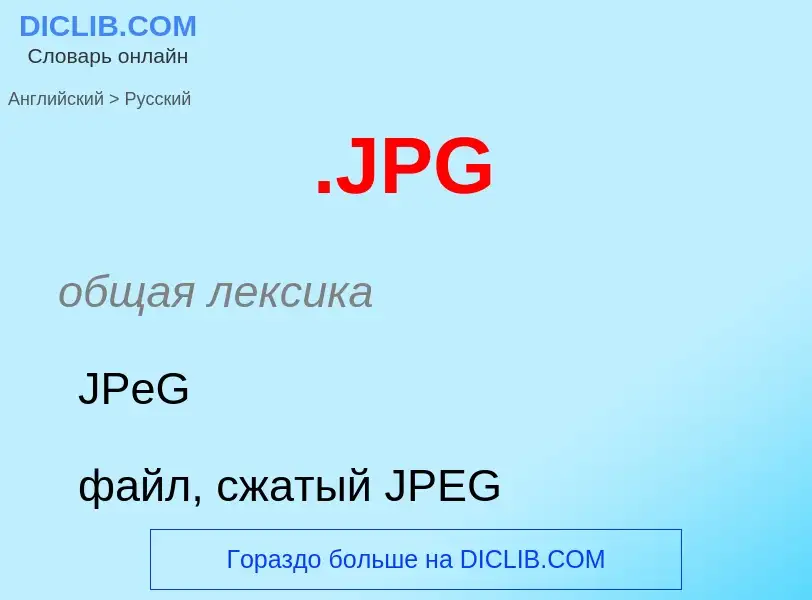Traducción y análisis de palabras por inteligencia artificial ChatGPT
En esta página puede obtener un análisis detallado de una palabra o frase, producido utilizando la mejor tecnología de inteligencia artificial hasta la fecha:
- cómo se usa la palabra
- frecuencia de uso
- se utiliza con más frecuencia en el habla oral o escrita
- opciones de traducción
- ejemplos de uso (varias frases con traducción)
- etimología
www jpeg org - traducción al Inglés
общая лексика
JPeG
файл, сжатый JPEG
графический файл в формате JPEG
общая лексика
(Joint Photographic Experts Group) Объединенная группа экспертов по машинной обработке фотографических изображений, группа JPEG
(произносится "джейпег") рабочая группа по стандартам цифровых видео- и мультипликационных изображений
алгоритм сжатия неподвижного изображения, алгоритм [стандарт] JPEG
стандарт на сжатие с потерями полноцветных неподвижных видеоизображений на основе алгоритма DCT с коэффициентом сжатия данных более 25:1, разработанный группой JPEG. Обрабатываются с использованием целочисленной арифметики непересекающиеся блоки изображения 8x8 пикселов. Этот алгоритм нельзя применять к чёрно-белым изображениям
формат JPEG
формат хранения сжатых алгоритмом JPEG графических файлов. Из-за потери качества при сжатии изображения неприменим в профессиональной допечатной подготовке (препрессе). Строго говоря, формат JPEG-файлов называется JFIF
Смотрите также
Wikipedia

JPEG ( JAY-peg, short for Joint Photographic Experts Group) is a commonly used method of lossy compression for digital images, particularly for those images produced by digital photography. The degree of compression can be adjusted, allowing a selectable tradeoff between storage size and image quality. JPEG typically achieves 10:1 compression with little perceptible loss in image quality. Since its introduction in 1992, JPEG has been the most widely used image compression standard in the world, and the most widely used digital image format, with several billion JPEG images produced every day as of 2015.
The term "JPEG" is an acronym for the Joint Photographic Experts Group, which created the standard in 1992. JPEG was largely responsible for the proliferation of digital images and digital photos across the Internet and later social media.
JPEG compression is used in a number of image file formats. JPEG/Exif is the most common image format used by digital cameras and other photographic image capture devices; along with JPEG/JFIF, it is the most common format for storing and transmitting photographic images on the World Wide Web. These format variations are often not distinguished and are simply called JPEG.
The MIME media type for JPEG is "image/jpeg," except in older Internet Explorer versions, which provide a MIME type of "image/pjpeg" when uploading JPEG images. JPEG files usually have a filename extension of "jpg" or "jpeg." JPEG/JFIF supports a maximum image size of 65,535×65,535 pixels, hence up to 4 gigapixels for an aspect ratio of 1:1. In 2000, the JPEG group introduced a format intended to be a successor, JPEG 2000, but it was unable to replace the original JPEG as the dominant image standard.


![The DCT transforms an 8×8 block of input values to a [[linear combination]] of these 64 patterns. The patterns are referred to as the two-dimensional DCT ''basis functions'', and the output values are referred to as ''transform coefficients''. The horizontal index is <math>u</math> and the vertical index is <math>v</math>. The DCT transforms an 8×8 block of input values to a [[linear combination]] of these 64 patterns. The patterns are referred to as the two-dimensional DCT ''basis functions'', and the output values are referred to as ''transform coefficients''. The horizontal index is <math>u</math> and the vertical index is <math>v</math>.](https://commons.wikimedia.org/wiki/Special:FilePath/Dctjpeg.png?width=200)






![The compressed 8×8 squares are visible in the scaled-up picture, together with other visual artifacts of the [[lossy compression]]. The compressed 8×8 squares are visible in the scaled-up picture, together with other visual artifacts of the [[lossy compression]].](https://commons.wikimedia.org/wiki/Special:FilePath/Jpegvergroessert.jpg?width=200)







